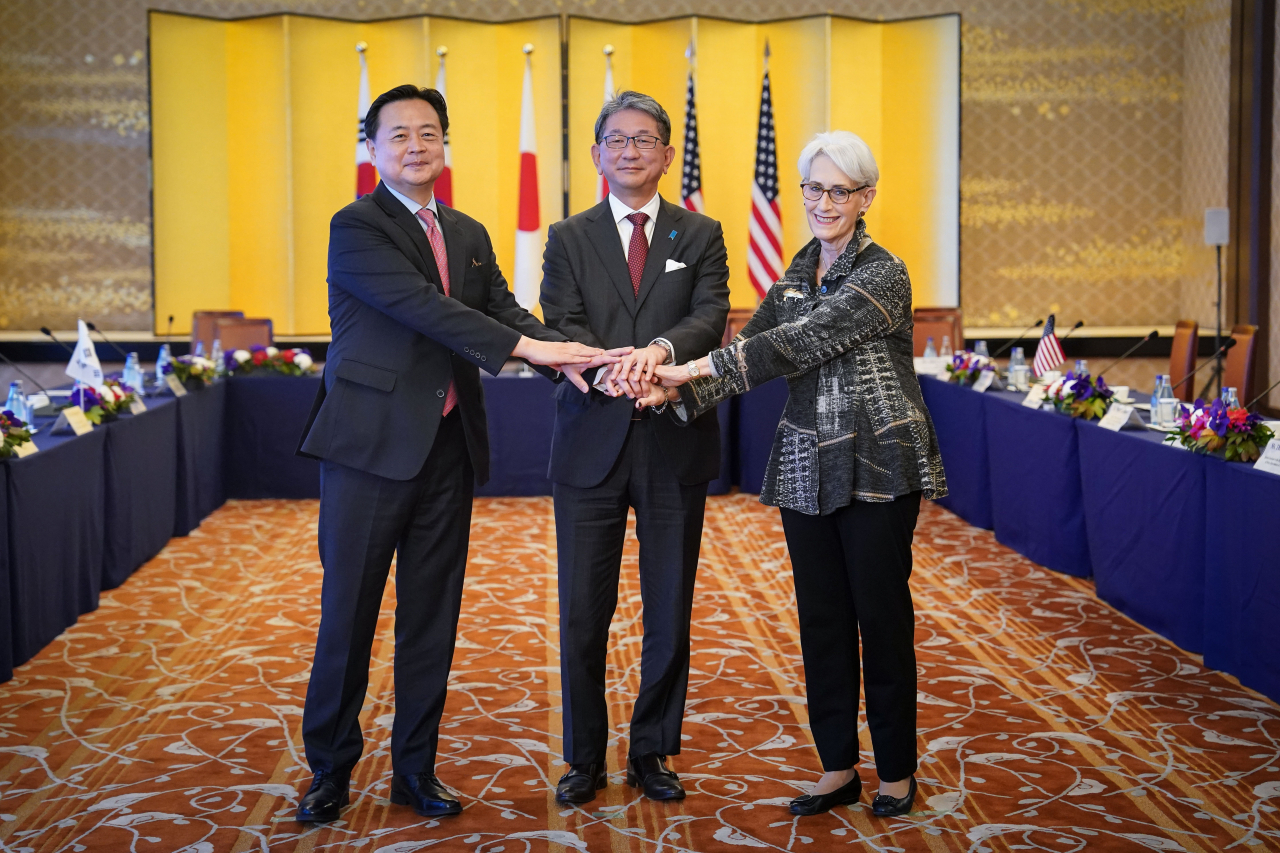 |
South Korean Vice Foreign Minister Cho Hyun-dong (left), Japanese Vice Foreign Minister Takeo Mori (center) and US Deputy Secretary of State Wendy Sherman hold hands during a media conference after their trilateral consultation meeting in Tokyo on Wednesday. (South Korea's Ministry of Foreign Affairs) |
South Korea, the US and Japan will respond on an "unparalleled" scale to a nuclear weapons test by North Korea, the three nations warned Wednesday.
As the three countries assess that North Korea is likely to carry out its seventh nuclear test soon, South Korean Vice Foreign Minister Cho Hyun-dong, US Deputy Secretary of State Wendy Sherman and Japanese Foreign Minister Takeo Mori held a trilateral consultation meeting in Tokyo to share their commitments for extended deterrence to handle Pyongyang's provocation.
"South Korea, the United States and Japan agreed that an unparalleled scale of response would be needed in case North Korea conducts a seventh nuclear test," Cho said in a joint news conference held after the trilateral consultation session ended, in Tokyo.
Sherman urged North Korea to refrain from further provocations, calling them "reckless and deeply destabilizing" for the region.
"Anything that happens here, such as a North Korean nuclear test ... has implications for the security of the entire world," she said.
Mori also said the three countries have agreed to deepen cooperation.
"We agreed to further strengthen deterrence and the response capability of the Japan-US alliance and the US-South Korea alliance, and to promote further security cooperation among the three countries," Mori said.
North Korea has been seen stepping up its weapons programs, test-firing a record number of ballistic missiles this year, which include one intermediate ballistic missile that flew over Japan and several intercontinental ballistic missiles.
Pyongyang has also fired hundreds of artillery shells off its coasts last week in a show of force against joint military exercises by South Korea and the US.
Seoul and Washington conducted joint military exercises involving one of the US' strategic assets, the nuclear-powered aircraft carrier USS Ronald Reagan, in the East Sea in September.
The last trilateral consultation meeting was last held in Seoul in June.
With the meeting coming at a time of heightened tensions not only over the Korean Peninsula but also Taiwan, the three sides also agreed to bolster cooperation to address the issue.
Sherman reaffirmed the US' commitment to support Taiwan's self-defense capabilities in the wake of escalating threats from China. She also said the three countries agreed securing peace in the region is crucial in maintaining world stability and peace.
"It is critical for the commerce of the world. It is critical for peace and security," Sherman said.
Taiwan's Foreign Minister Joseph Wu raised concerns Tuesday that China is likely to ramp up its diplomatic "attacks" on Taiwan, as China's ruling Communist Party wrapped up its twice-a-decade congress, where Chinese President Xi Jinping cemented this third term in office last week.
During his trip to Japan, the Korean vice foreign minister also held separate talks with Sherman and Mori on Tuesday.
In the meeting with Mori which lasted for 90 minutes, the two sides talked “in-depth” on the possible solutions to Japan’s wartime forced labor issue, according to a Foreign Ministry official who accompanied Cho for the bilateral meeting.
Seoul and Tokyo are seeking to mend ties and find solutions in response to a Korean top court's ruling. The court ordered the liquidation of two Japanese companies’ local assets in order to pay compensation to Koreans coerced into labor by the companies during Japan's 1910-1945 colonial rule of the Korean Peninsula.
By Jo He-rim (herim@heraldcorp.com)







